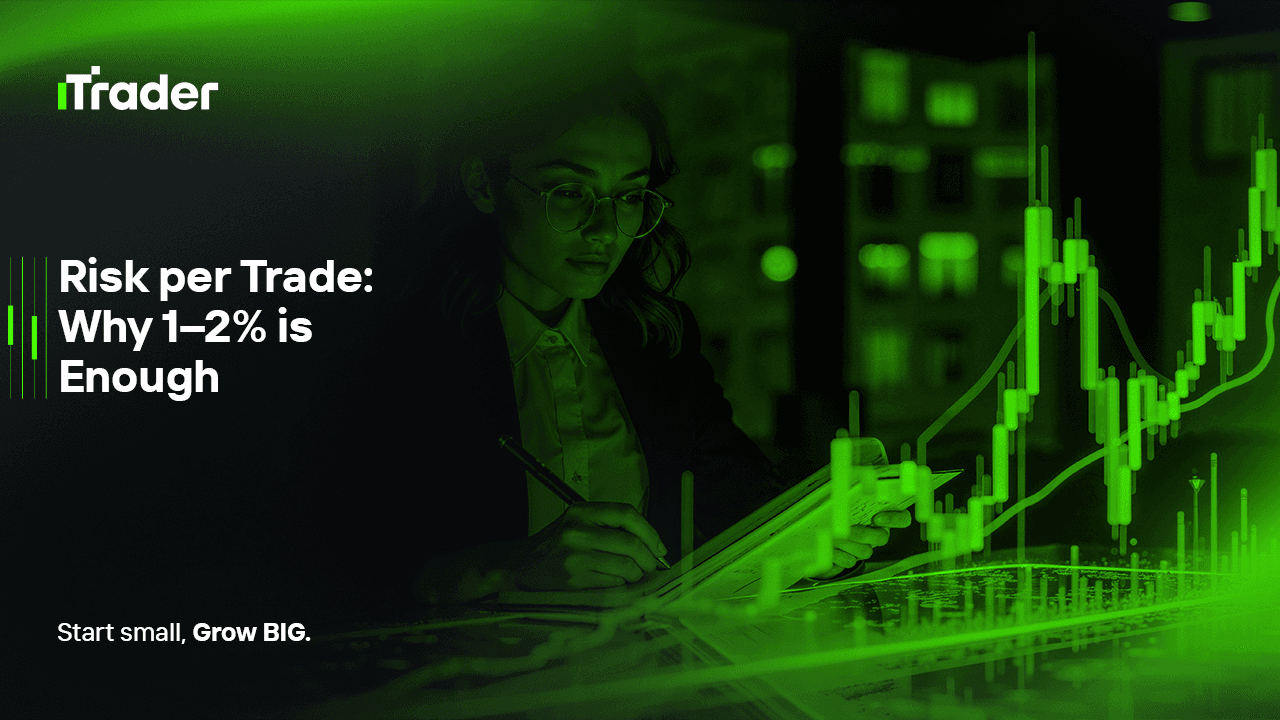2025-09-11
In forex trading, many traders focus on building profitable strategies, finding the best indicators, or identifying precise entry and exit points. Yet, the single most critical factor behind long-term success is risk management. The trader’s first goal is not to make money but to protect capital. This leads to the fundamental question: “How much of my account should I risk on a single trade?”

While there are many opinions, most professional traders and prop firm mentors agree on one golden rule: risking only 1–2% of your account per trade.
This blog will explain why that range has become the professional standard, backed by mathematics, psychology, and practical experience. We’ll also explore how this rule applies in the context of prop firm challenges, where strict drawdown rules demand disciplined risk control.
Risk per trade is the percentage of your trading account you are willing to lose if a trade goes against you.
For example:
This percentage determines not only your survival but also your ability to remain in a prop firm challenge, where strict daily and overall loss limits are enforced.
The 1–2% rule is based on statistical survival. It keeps losses small and recoverable.
As Warren Buffett famously said:
Preserving capital is the foundation of longevity in trading.
The probability of blowing an account (Risk of Ruin) grows exponentially when risk per trade increases. By keeping it within 1–2%, this probability becomes negligible, even through extended losing streaks.
Risking 5–10% per trade can quickly put an account into deep drawdown. Just a few losing trades may render recovery mathematically and psychologically impossible.
Large losses create fear and frustration, which disrupt discipline and often trigger impulsive decisions.
Traders who take oversized risks often try to “make it back quickly” with even larger positions. This is the fastest way to blow an account.
Prop firms like FTMO and MyForexFunds impose strict risk parameters:
If you risk 5% per trade, one bad trade could cause immediate failure. By keeping risk to 1–2%, you allow room for multiple trades and reduce the chance of disqualification.
Profitability is measured by expectancy:
Expectancy=(WinRate×AverageWin)–(LossRate×AverageLoss)Expectancy = (Win Rate × Average Win) – (Loss Rate × Average Loss)Expectancy=(WinRate×AverageWin)–(LossRate×AverageLoss)
With 1–2% risk, your losses remain small, and profitable trades can expand the account through favorable risk-to-reward ratios.
Keeping risk fixed at 1–2% allows for proper position sizing and consistent exposure, regardless of strategy or market volatility.
Let’s take a $100,000 prop firm challenge:
Clearly, the 1–2% approach provides far more breathing room.
The 1–2% rule is not just a guideline; it is a professional standard grounded in:
In trading, survival comes before profit. By keeping risk low, you buy yourself time for your edge to materialize. The 1–2% risk rule is the safest and most effective path to long-term consistency.
© 2025 iTrader Global Limited | Số đăng ký công ty: 15962
iTrader Global Limited có trụ sở tại Hamchako, Mutsamudu, Đảo tự trị Anjouan, Liên bang Comoros và được cấp phép, quản lý bởi Ủy ban Chứng khoán Comoros. Giấy phép số: L15962/ITGL.
iTrader Global Limited hoạt động dưới tên thương mại “iTrader” và được cấp quyền thực hiện các hoạt động giao dịch ngoại hối. Logo, thương hiệu và trang web của công ty là tài sản độc quyền của iTrader Global Limited.
Các công ty con khác của iTrader Global Limited bao gồm: iTrader Global Pty Ltd, số đăng ký công ty tại Úc (ACN): 686 857 198. Công ty này là đại diện được ủy quyền (số đại diện AFS: 001315037) của Opheleo Holdings Pty Ltd (giấy phép dịch vụ tài chính Úc AFSL: 000224485), có địa chỉ đăng ký tại: Tầng 1, số 256 đường Rundle, Adelaide, SA 5000.
Tuyên bố miễn trừ trách nhiệm: Công ty này không phải là tổ chức phát hành và không chịu trách nhiệm đối với các sản phẩm tài chính được giao dịch trên hoặc thông qua trang web này.
Cảnh báo rủi ro: Giao dịch CFD có mức độ rủi ro cao do đòn bẩy và có thể dẫn đến mất vốn nhanh chóng, không phù hợp với tất cả người dùng.
Giao dịch quỹ, CFD và các sản phẩm có đòn bẩy cao khác đòi hỏi kiến thức chuyên môn.
Nghiên cứu cho thấy 84,01% nhà giao dịch sử dụng đòn bẩy bị thua lỗ. Hãy đảm bảo rằng bạn hiểu rõ rủi ro và sẵn sàng chấp nhận mất toàn bộ số vốn trước khi giao dịch.
iTrader tuyên bố rằng họ sẽ không chịu trách nhiệm đầy đủ đối với bất kỳ rủi ro, tổn thất hoặc thiệt hại nào phát sinh từ hoạt động giao dịch có đòn bẩy, dù là đối với cá nhân hay pháp nhân.
Hạn chế sử dụng: iTrader không cung cấp trang web hoặc dịch vụ cho cư dân tại các quốc gia nơi hoạt động này bị cấm bởi pháp luật, quy định hoặc chính sách.